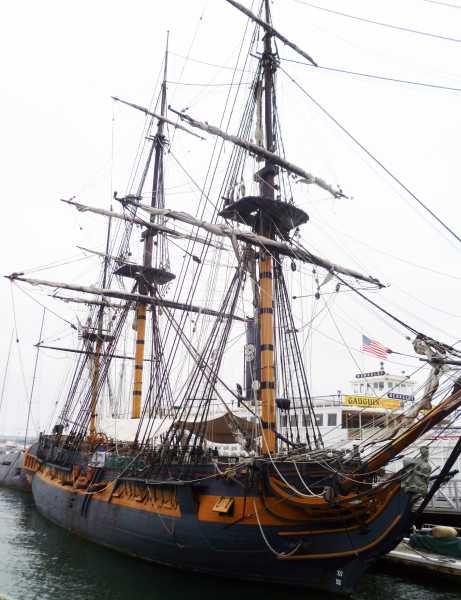Peter Weir’s cult classic suggests that something is lost in a world without hierarchy.

When Robert Peel was appointed Under-Secretary for war and the colonies for Great Britain in 1810, in the middle of the greatest war it had seen, he was only twenty-two. On his appointment, he received a letter from his dean at Christ Church Oxford. “Work very hard and unremittingly,” it said. “Work, as I used to say sometimes, like a tiger, or like a dragon, if dragons work more and harder than tigers. Do not be afraid of killing yourself.”
The Napoleonic Wars were won by young men entrusted with incredible amounts of responsibility, and callow youths did work themselves to death as clerks in the offices of Whitehall. William Pitt the Younger died at the age of 46 after years of sickness, leached of his health by serving in the role of wartime prime minister for fully half his life. His departments were staffed and led by as many 20-year-olds as 60- and 70-year olds.
In Peter Weir’s Master and Commander: The Far Side of the World, we see the other ways young men won the war, in gory detail. The elfin 13-year-old midshipman William “Lord” Blakeney has his arm amputated, of course sans anesthesia. The film is about homosociality in all its guts and glory, from the friendship between Dr. Stephen Maturin and Captain Jack Aubrey that undergirds it, to the closed-ranks the ship’s crew present to the unlucky Midshipman Hollum, an eventual suicide.
Master and Commander, which celebrates its 20th anniversary today, was not a smash box office hit (it came in second in 2003’s Christmas season, to Elf). But it has reemerged as a cult classic, a phenomenon for which observers advance different explanations. In March, GQ asked “Why Are So Many Guys Obsessed With Master and Commander?” and sourced a cluster of predominantly New York leftist men to explain their affections.
The writer hastens to point out that the movie is “beloved by a certain type of guy (gender neutral)” and that “any nostalgia for the traditionalism in the movie is less reactionary and more about the healthy male bonding between the characters.” This is not really true. There’s plenty of unhealthy men with unhealthy relationships: see the bullying of a colleague into killing himself. But there is “healthy” male bonding in the movie and the original novels by Patrick O’Brian.
Aubrey and Maturin are a fully realized friendship, a kind of Frodo-Sam pairing in which the guys don’t just suffer together but actually commune. That relationship keeps the novels and movie from being just a genre fiction jaunt. The novels themselves, fans will inform you, are formally titled the Aubrey-Maturin series. (I have read 11 of the novels, enough to be considered a grade A nerd but not enough to claim real expertise.)
That series is more expository than the movie, and has a particular appeal to the autistic and their fellow-travelers. O’Brian has a habit of using the landlubber Maturin as a foil for the explanation of nautical facts and mechanisms. By contrast, the heavily memed title screen of the film contains all the necessary exposition: Oceans Are Now Battlefields. Critics in 2003 poked at it for a plot that landed “On the Far Side of Credibility,” as the New York Times’ Jason Epstein put it.
Even critics like Epstein appreciated how accurately the film captured details of the period and the nature of war on a ship at sea: the long stretches of grinding maintenance tasks, mending rope or sails, punctuated by achingly slow pursuits.
Those tasks were mirrored by massive systems of regimented production on the homefront. As Roger Knight puts it in his excellent history Britain Against Napoleon, “The foundations of military victory lay in…the diligence of shipbuilders and the makers of ropes.” Care in craft played an essential role in military success. The underground water storage tanks built at Gibraltar during the war for the British Navy were still in use in this century.
Subscribe Today Get daily emails in your inbox Email Address:
But Master and Commander is a compelling dude movie principally because it presents a world of organized, coordinated busyness among the members of a tight-knit warband. Like the ancient Indo-European comitatus, the crew of HMS Surprise is tied to its leader by an explicit oath of fealty. Under the leadership of someone like Russell Crowe’s Aubrey, that warband can be incredibly effective, and that leadership turns the terrible drudgery of work on the open sea into something fulfilling. Zones of action that hold out the promise of coordinated, task-oriented grand achievement will always be attractive to young men: space, the ocean, Silicon Valley.
The Napoleonic wars, in their naval form, were won by thousands of these cadres, toiling away beyond civilized life. Regimented systems of command and control, combined with communication difficulties, put tremendous pressure on relatively green leaders to make decisions that could be justified to the Admiralty.
The lives of the men fictionalized in Master and Commander were profoundly unfree. Their paths were often set before they’d reached puberty, or forced upon them by press gangs. What contemporary viewers envy them is not their diet, or the health of their teeth, or their romantic lives. It’s the doing things together, the pulling toward the same goal and experiencing glory in doing so. The forms of communal life that permit that don’t tend to be presented to teens and late zoomers; they’re counseled to spend as much of their time as possible learning about the world and themselves before committing to a particular path. Master and Commander suggests that the constraint of being under authority, in its best form, might be something valuable.
Sourse: theamericanconservative.com